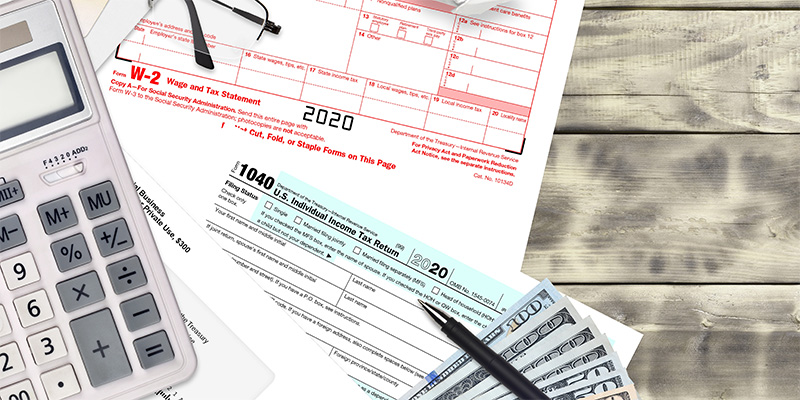
Do Your Own Taxes While Your Financial Life Is Simple
The deadline for filing taxes just passed yesterday, and it reminded me of this valuable lesson…
While taxes are a nuisance, you should prepare them yourself when you’re young, at least for a while.
This is the best way to master the basics—credits vs. deductions, whether you can file as head of household, itemizing—all the stuff most people would never learn about if they didn’t have to.
It’s sort of like mastering long division before you pick up a calculator. If you never bother to learn how stuff works, it’s going to stay a mystery forever.
If you only understand taxes as well as, say, quantum physics, they can be scary. Really scary… even if you don’t owe anything. Because you have no clue what’s going on.
Doing your taxes yourself changes that.
The Old Days of Pencil and Paper
When I started doing my own taxes in the ’90s, it was all on paper.
You had to sit there with a pencil and manually fill in the forms. Once the numbers checked out, you would fill it in with pen, stick it in an envelope, and mail it off.
Going through this exercise is how I started to learn about taxes. I was in the Coast Guard Academy at the time, and they actually pay the cadets there. There’s no tuition, and you get a salary. Back then, it was somewhere around $500 a month. But we’d only get around $200 after they deducted the cost of books, uniforms, and stuff like that.
Still, we were taxed on the full amount, which maybe came to $6,000 a year. Most of us didn’t have any other income, so it was the easiest tax return in the world—income and tax withheld, that was basically it. You jotted that information down on a 1040EZ, and that’s how I started doing my own taxes.
Now, at 18 or 19 years old, I didn’t understand income, depreciation, any of that. I had no idea what was going on. But after doing my own taxes for a while, it started to make sense.
Unless you’re born into money, your financial life starts out super simple. You have a job, you earn income–probably W2 income because you’re working for an employer.
Taxes are withheld from that income. You compute the amount you’re supposed to pay, probably discover your taxes were over-withheld, and apply for a refund. That’s it.
You don’t need an accountant for that. You can use H&R Block’s free online program and do it yourself.
Stop Before You Break the Furniture
I did my own taxes from 1996 to 2006, so up to about age 32. Then they started to get really complicated.
That final year, I set up a makeshift tax office on my coffee table and kept making mistakes.
After two whole days of doing taxes on this coffee table, I made one last mistake and just lost it. I started pounding on the coffee table, it broke, and I kept hitting it until there were splintered pieces of wood everywhere.
Eventually, I picked up all the wood in my arms, carried it downstairs past my wife, and… that was it.
It was time to stop doing my own taxes.
When Life Gets Complicated
When you get older and start to acquire possessions, your financial life gets a little more complicated.
Maybe you buy a house. Then you get to deduct the mortgage interest, so you get a form from the bank at the end of the year showing all the mortgage interest you paid. Now you’re itemizing deductions.
Then you might get a brokerage account. You’re trading stocks, and now you have capital gains, you have dividends, and you’ve got to do a Schedule D.
At this point, you can probably still do your own taxes with the help of some online program. It won’t be free anymore, but I bet you could still plug through it.
Then, when you’re a bit older, things might get really, really complicated.
Maybe you’re getting stock options at work. Or you bought a rental house, so you’re earning passive income. That’s when most people need to hire a professional.
The Added Bonus
When your financial life gets complicated enough to hire a tax guy, all those years of doing your own taxes will pay off.
You will have built up a certain level of tax literacy, so you won’t stare blankly when your accountant says words like “amortize” or “depreciation.”
It’s also a good way to protect yourself from a tax guy who doesn’t know what he’s doing. Think about it… if you know a little bit about cars, it’s much easier to find a good mechanic. Learning how to change the oil, fix a flat, jump a battery—those skills teach you a bit about how cars work, which makes it easier to spot a hack.
Same thing goes for tax guys. When you understand the basics, it’s much easier to spot the “pro” who is clueless.
So, do your own taxes when you’re young and your financial life is simple. Eventually, you’ll start making more money and your taxes will get a lot more complicated. That’s when it’s time to hire someone—ideally before you start breaking the furniture.

Jared Dillian
|

An Emergency Fund Will Save You
Seems like every time I turn around, I need to pay to fix something. These unforeseen expenses… we have no choice but to pay ’em.

3 Places to Park Your Cash Amid Banking Crisis
It's not good to have all your money in the same place.
How to Volatility-Proof Your Portfolio
Asset allocation is the most important thing in the world. Yet most investors spend zero time thinking about it.
‹ First < 12 13 14 15 16 > Last ›

